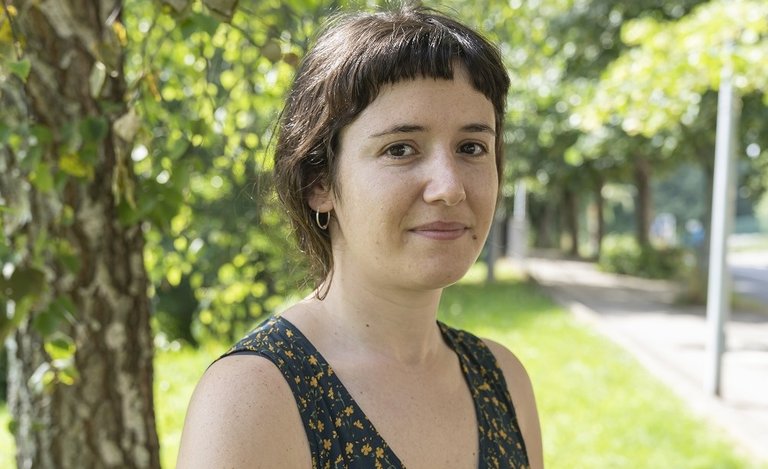"An ID is always an achievement; it's exciting"

Caterina Raffon, from the first word, reveals her origins: “I am from Italy. I was born in Sicily, but I did my degree at the University of Bologna.” The University of Bologna, founded in 1088, is the oldest university in Italy and Europe, ahead of Oxford, Paris, Salamanca and Coimbra. Raffone went there to study criminology, but, he explains, he didn’t like it as much as he thought, since it was mainly oriented from the point of view of law and sociology. “I probably chose my career because of the film and that, and I expected something more, more scientific, less literary,” he confesses.
He came to San Sebastián to do Erasmus, a law school, a career in criminology. There he had the opportunity to take scientific lessons and also to meet Gabilondo Etxeberria de Pako. "With his help, I entered the world of anthropology. It took me to a Spanish Civil War exhumation and brought me closer to this world. So to speak, I have grown up with Lourdes Herrasti Erlogorri and Paco."
Following the advice of Etxeberria, when he returned to Italy, he finished criminology and began a postgraduate course in biology. When he also finished it, he wanted to go deeper into anthropology and forensic technology, but in Italy there was no master’s degree in this regard. So he moved to Barcelona where he studied a master’s degree in forensic anthropology with biomedical applications. "That's when I got into forensic genetics, and I also did my final master's work in this field, identifying the victims of the Spanish Civil War. It was clear to me that this is my path. I played forensic genetics, and I saw that it fills me, that I like it, and that I want to do this."
Taking the Road Step by Step
As he was also satisfied with his colleagues in Barcelona, he tried to do his doctorate there, but his Italian undergraduate qualification was not enough to apply for a scholarship and he could not stay without it. "Then I contacted Paco again and told him that I wanted to do a doctorate and that I would like to combine anthropology and genetics. He replied that there was a forensic genetics laboratory in the UPV/EHU, in Vitoria-Gasteiz (BIOMICs), which allowed me to carry out the work, between Aranzadi and the laboratory. I have been working with samples of remains extracted from the pits of the Spanish Civil War, environmental factors (temperature, pH...) Studying their impact on DNA conservation," explains Raffoni.
In the course of his work, he obtained a doctoral contract, so that he has managed to finish his doctorate and is now continuing in the same laboratory with the contract of the UPV as a postdoctoral researcher.
He does not hide the fact that his work has an emotional aspect: "We analyze samples from reservoirs throughout Spain and we don't care where they come from, an identification is always an achievement. When we have contact with family members, it is very emotional; especially if they are children, but also if they are from further afield. We do it in the Basque Country with Aranzadi and in Spain with other associations."
The biggest difficulty is the condition of the remains, which is why he chose to investigate the factors that influence the conservation of DNA in his thesis. “They’re often very degraded and it’s hard to get DNA.” It is also not always easy to get samples from close relatives.
Funding is also often a significant limitation in research, but in this sense, public institutions are supported at the following times: In the Basque Country, the Institute of Remembrance, and in Spain, within the Law of Democratic Memory.
It's three colleagues in the lab, all three women. "I think it's a coincidence that all three of us are women. It is true that, in films and in such cases, criminologists are usually men, but then there is Lourdes Herrasti, who works with picacho and shovels like anyone else or even harder. It’s exemplary for us,” Raffoni admits.
In the future, he would like to continue this work, but he knows that it depends on political will. He doesn’t want to go back to Italy. "I have a good relationship with some of the laboratories there, but I have family here and I want to stay here," he says.
Buletina
Bidali zure helbide elektronikoa eta jaso asteroko buletina zure sarrera-ontzian












